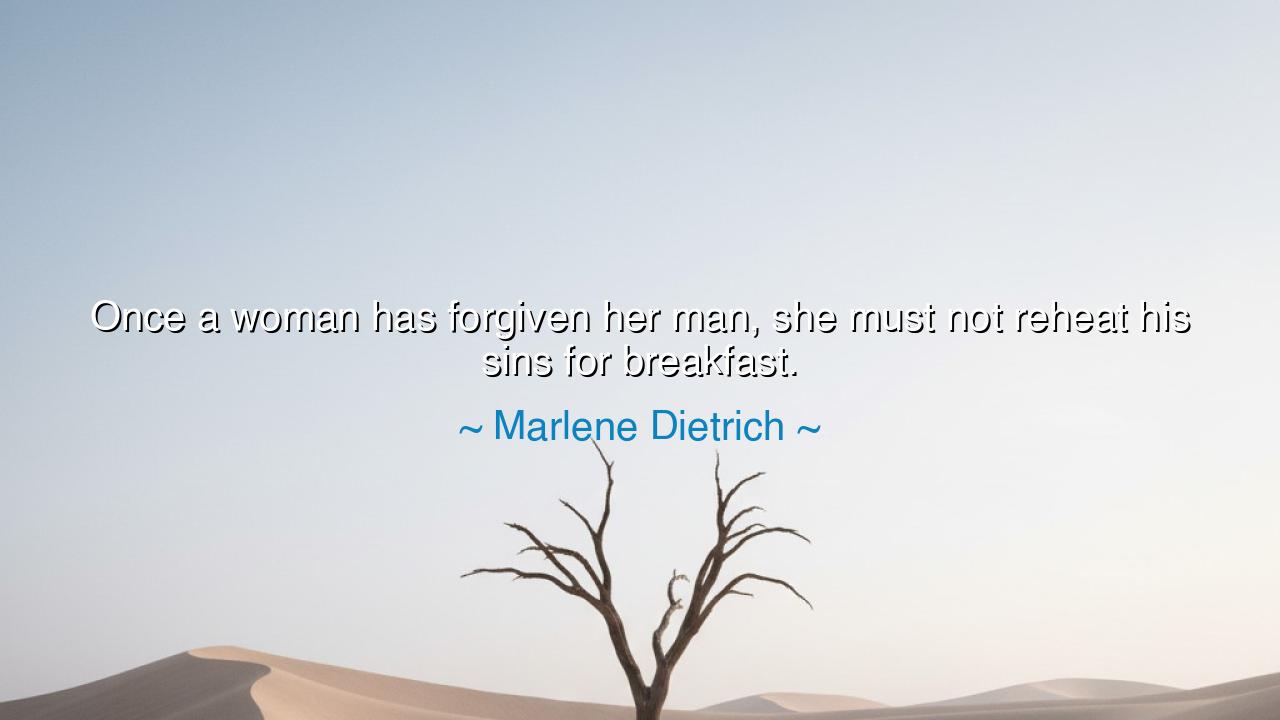
Once a woman has forgiven her man, she must not reheat his sins






Marlene Dietrich, with a sharp tongue and a heart seasoned by life’s storms, declared: “Once a woman has forgiven her man, she must not reheat his sins for breakfast.” Though spoken with wit, these words carry a truth as ancient as love itself: forgiveness must be whole, or it is no forgiveness at all. To cling to past wrongs is to poison the present, to feed daily upon bitterness rather than peace.
The ancients would have seen in this the wisdom of harmony. For in any bond — whether of lovers, friends, or kin — strife is certain, and mistakes are many. But the power of forgiveness is the power to cleanse the slate, to restore unity where division once grew. Yet if those sins are “reheated,” if they are served again and again upon the table of memory, then forgiveness becomes an illusion, and love grows weary beneath the weight of old wounds.
To call these grievances breakfast is to show how easily they can become a daily ritual — the first taste of the morning, bitter and unwelcome. Dietrich warns us that no heart can flourish when nourished on resentment. True forgiveness is an act of courage, demanding that the past be left buried, lest it rise again to haunt the living bond.
The origin of this wisdom lies not only in Dietrich’s wit, but in the long tradition of human relationships. Every culture has taught that trust is fragile, and that woman and man, bound together, must guard it carefully. To forgive is divine, but to forgive and then rehearse old grievances is to rob the act of its grace. Thus, her counsel is both humorous and stern: do not undo with memory what you have healed with mercy.
Let future generations remember: forgiveness is not half a gift, but a complete offering. To give it is to lay aside the knife of accusation, never to raise it again. If love is to endure, it must be nourished not with the stale bread of past sins, but with the fresh feast of trust, joy, and hope. For only then can hearts walk forward together, unburdened by yesterday’s shadows.






CBDoan Chi Binh
This quote seems to suggest that real forgiveness involves a kind of mental reset. Once you’ve forgiven, it’s about letting go of the hurt and not revisiting it. But is it always easy to do this, especially if the hurt runs deep? How do you deal with the urge to bring up past wrongs after forgiveness, and do you think it’s a sign that forgiveness hasn’t fully taken place?
KVLe Vu Khanh Vy
Dietrich's quote strikes a chord with me because it emphasizes the need for closure in forgiveness. It’s not enough to say you’ve forgiven; you must actively choose not to dwell on what’s been forgiven. Can true forgiveness happen if you keep bringing up the past? How do you avoid falling into the trap of rehashing old arguments and grievances after you've forgiven someone?
DDDạng Dạng
I love this quote because it reminds us that forgiveness is not just about letting go of the offense, but also about moving forward without dragging the past into the present. It brings up the idea that holding onto past mistakes can prevent growth in a relationship. How do you stop yourself from 'reheating' past mistakes after forgiving someone? Is it all about setting boundaries and letting go of grudges?
HMHuyen Mai
This quote made me reflect on the complexities of forgiveness in relationships. It suggests that forgiveness should come with a clean slate, but can people truly forget the past completely? Is it human nature to hold onto resentment, or can we consciously let go and start fresh every time? How can one practice 'moving on' after forgiveness without forgetting the lessons learned?
THvu thi hai
Marlene Dietrich's quote really highlights the importance of moving forward after forgiveness. It’s easy to say you've forgiven someone, but if you keep bringing up past mistakes, it can hinder healing. Do you think it's possible to truly forgive someone and not revisit their past mistakes, or does it require a lot of self-discipline to avoid reopening old wounds?